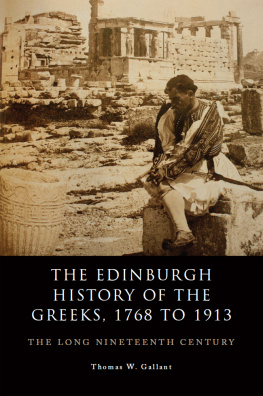THE GREEKS IN HISTORY
THE GREEKS IN HISTORY
Alan E. Samuel
Edgar Kent, Publishers Inc
TORONTO 1992
Copyright 1992 by Edgar Kent, Inc., Publishers
All Rights Reserved
Edgar Kent, Inc., Publishers
University of Toronto Press
340 Nagel Drive, Buffalo, New York 14225 U.S.A
5201 Dufferin Street, Downsview, Ontario Canada M3H 5T6
Canadian Cataloguing in Publication Data
Samuel, Alan Edouard
The Greeks in History
Includes bibliographical references and index.
ISBN 0-88866-639-X
1. Greece - Civilization - To 146 B.C.
2. Greece - History - To 146 B.C. I. Title.
DF77S26 1992 938 C92-094709-3
Design: Peter Maher
Printed in the United States of America
To Valerie1 The Aegean world, showing the cities controlled by Athens
2 The scope of Greek colonization 750550 BC
Contents
Preface
This book is intended for people with no prior knowledge of Greek history, but I hope that some of the ideas and interpretations will be of interest and value to those who already have much of the specific information contained in some of the chapters. The study of Greek history has always been rewarding for those whose horizens have opened with knowledge of human experience in the past, and I have tried to make that the major goal of the book, while not neglecting the facts and events which make up part of that knowledge. Some chapters, therefore, have more specific information, while others concentrate on interpretation and evaluation. I hope that readers will find the balance satisfactory, and I hope even more that in avoiding a strictly chronological account, I have remembered in each chapter to present the information essential to the interpretation and comment.
There are also characteristics of the account which may seem strange to some academic readers: no footnotes, no specific citations of quotations from ancient authors, and no quotations of modern historians. There are fewer dates than one might expect in a history book, and little discussion of battles beyond the statement of how they came out. Part of the reason for writing this way relates to my own interests, and part is deliberate. I am not expecting to emulate ancient historical writers by omitting page references, but I hope my text will flow a little more amiably if I do so. I cannot imagine most people needing to know precisely where in Thucydides or Herodotus or other texts my quotes can be found, and they are all such well-known items that professional historians will have no difficulty in recognizing them as genuine. I have avoided footnotes because most of what I have written is, in terms of fact, basic, and need not be argued or supported. Where I interpret, I see no point in burdening the reader with the names of those with whom I agree or disagree.
Dates, unless specifically noted, are all B.C., and I have used that designation at the beginning of the book to establish it in the readers mind. Greek names have usually been given in accepted English style, rather than in transliteration. In most instances, I have avoided Greek terms when English will do, preferring heavy-armed infantryman, for example, to hoplite. Where I do use Greek words as part of the text, as I do with metic, I use the word in its English form or italicize a transliteration. All this aims at a little reduction in the bewilderment so often produced by the barrage of unfamiliar names and terms in books about the Greek world.
In readying this for the press, I have had the kind and invaluable help of Professors Catherine Rubincam and Gary Reger, and of Richard Hazzard, all of whom were kind enough to read the work in proof just before it went to press. They alerted me to many points at which the text could be improved, and I am very grateful for their advice and suggestions. The weaknesses that remain are, of course, my faults of haste and perversity, and I hope that they will not mislead too many and will amuse some. The present volume is, in a way, a preliminary edition, which I hope to follow in a second edition in the not too distant future. I will be very grateful for comments, advice and corrections for that edition.
Toronto, July, 1992
1 Why Greek History?
One of the most famous episodes in Greek history is the story of Croesus, king of Lydia. When he asked the oracle at Delphi what would happen if he attacked Persia, it told him that if he did that, he would destroy a great kingdom. The oracle was right, but the kingdom destroyed as a result was Croesus own. There is another oracular story: Hippias, the son of the tyrant of Athens, and who had been tyrant in his own right, was told that he would be buried in Athenian soil. When he was very old, and after he had been expelled from Athens, he was part of a Persian force invading Attica, confident of success because of the prediction of Hippias eventual location. As the troops landed, Hippias sneezed, and one of the old mans teeth fell out. It was the only part of Hippias to be buried in Athenian soil, and the invasion failed.
So oracles worked, and the gods knew the future of Greece. People did not, however, and they repeatedly sought prophetic revelations. There is a bit of logical inconsistency here, however: if prophecy can work, what good does it do? If the universe is to unfold, what is the advantage of knowing in advance what cannot change? The Oedipus story is a case in point. Oedipus parents, king and queen of Thebes, received a prophecy that their son would kill his father and sleep with his mother. Trying to evade that doom, they ordered a shepherd to take the infant and leave him to die in the wilderness. Pity for the child led to his being let live, and eventually he found his way into the family of the king and queen of Corinth, where he was raised as that couples child. He then heard of the prediction of his terrible future, but thinking he was actually the son of the parents he knew, he left the palace to avoid fulfilling the prophecy. In his travels, he met his (birth) father on the road and killed him, and later found his way to the city where he had been born, and married his mother, the widowed queen.
So prophecy was fulfilled, and human attempts to evade it futile. But they are more than futilethey are logically inconsistent. If you believe in prophecy enough to have an infant killed, why do you not believe in it enough to abandon the attempt to evade it? Greeks, I suggest, did not worry so much about this logical inconsistency, or even the logical problems created by a belief in fate. These are issues of real importance only when the issues of divine goodness and free will emerge as critical Christian problems, and I do not intend to deal with them here. Rather, I want introduce these oracular stories as a reminder that the Greeks had very different mental constructs to deal with issues they had in common with us. Dealing with oracles is another way of treating questions of choice and chance, and these are matters at the heart of history.
To ask the question Why study History? is to make so general a query as to call for too vague an answer. Why study Greek History? works as well, because it allows for some specific answers to fill out the response to the wider question. But even the more specific question requires some clarification about the subjects of study. Do we mean events, all events, social, cultural, personal and economic, or just political events, or some but not all of these? And do we mean to study only those events which come to public notice, or seem to relate to public events, so that a politicians sexual habits are of interest, even though private matters, while those of his brother-in-laws second cousin once removed are of no interest to history? Or is it not events we study, but causation, in order to understand why things happen, perhaps to help us in decisions in the future, as some ancient Greek historians thought as they sat down to write.












